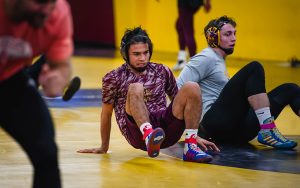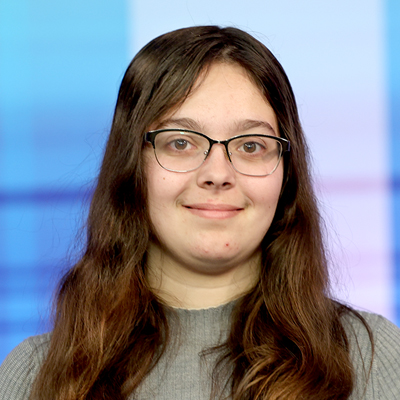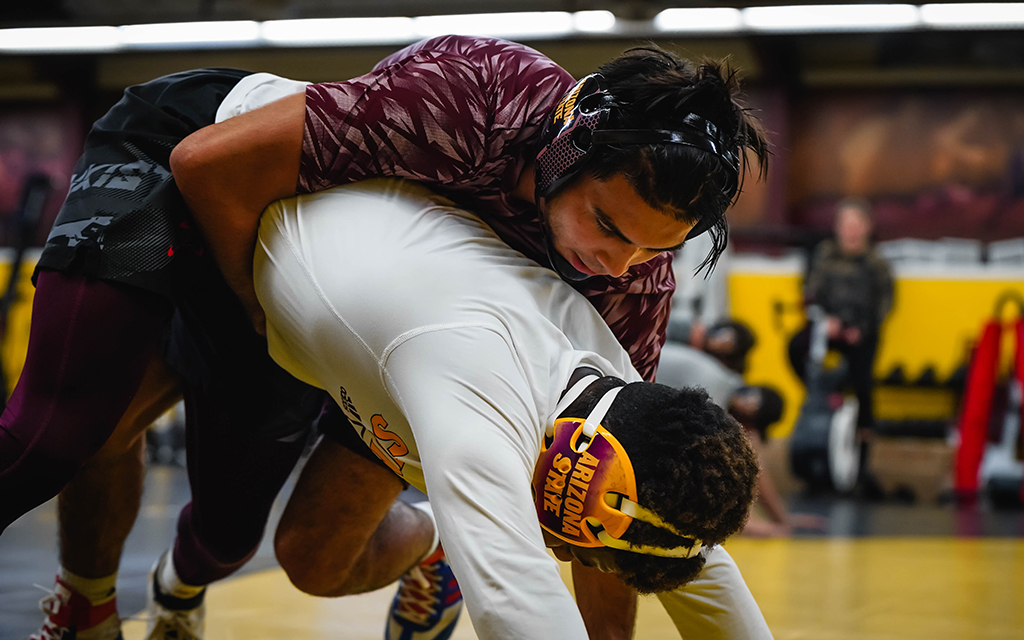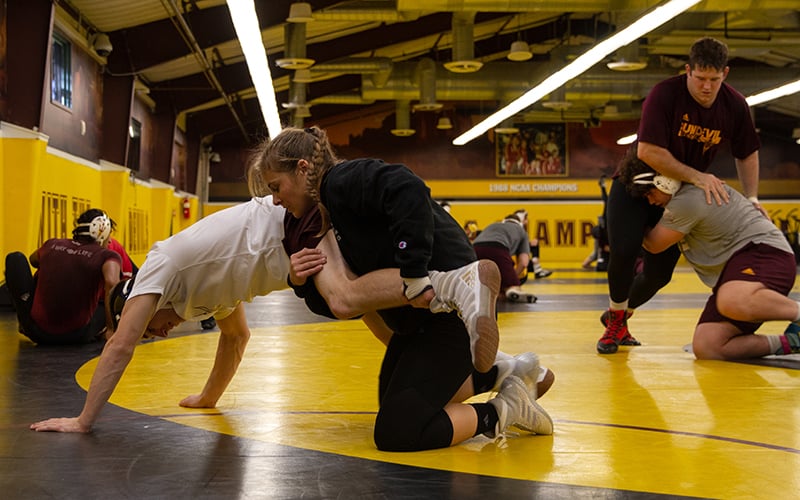PHOENIX – Behind Farrington Stadium and the Kajikawa Practice Fields, where Arizona State University’s softball and football teams play and train, a long white building is home to one of the most successful athletic clubs in the Valley.
In its more than 47 years of existence, Sunkist Kids Wrestling Club has sponsored over 117 medal winners – 29 coming from the Olympics (including 12 gold) and 88 from the World Wrestling Championships, according to the regional training center’s website.
“The best wrestlers in American history have wrestled for the Sunkist club,” said ASU wrestling coach Zeke Jones. “They sponsor athletes to help them achieve their dreams and goals of being world and Olympic champions.”
Sunkist Kids has sponsored six-time world champion and Olympic gold medalist Jordan Burroughs and three-time world champion and gold medalist Helen Maroulis, to name a couple.
While the club’s primary focus is elite postgraduate wrestlers, like Burroughs, Sunkist Kids executive director Kim Matori-Wickey said the club is open to sponsoring athletes of all ages, an opportunity one Goodyear native has seized.
“I’ve been training with Sunkist since as far back as I can remember,” said Brandon Courtney, who currently wrestles for ASU as a redshirt senior. “It’s funny because I started wrestling and I used to come to the ASU room all the time, and I’m still here to this day.”

Courtney and the ASU wrestling team will return to the mat Friday against Little Rock at Mullett Arena. (Photo courtesy of ASU Athletics)
Courtney credits Sunkist Kids and ASU wrestling for his success, saying sparring with elite athletes and traveling around the country with the program has made him a stronger wrestler. No amount of improvement and success can replace the inspiration he gained during his younger days.
“Being in a safe practice room, growing up and seeing top wrestlers as a kid, it’s amazing,” he said. “It keeps you motivated to stay wrestling.”
It’s an experience that is not unique to Courtney. Many of the Sunkist Kids wrestlers – like Kennedy Blades, who currently attends Arizona State but does not wrestle for the Sun Devils – also stressed that training with other top talents has improved her wrestling.
In addition, off-mat offerings like supplements, massages and Neuro Force One fitness training in Scottsdale drew Blades to ASU and, ultimately, Sunkist Kids.
“I’ve been getting bigger, stronger, faster and a lot healthier,” Blades said. “Sunkist’s definitely the best in the nation.”
For Sunkist Kids coach Mark Perry, what makes the club one of the best is simple: resources. He highlighted the close proximity to ASU wrestling, top coaches and medical technology to benefit Sunkist Kids.
“The number one thing we provide is resources,” Perry said. “Wrestling is not a sport at the professional level that has the resources of the NFL, MLB or NBA, so we are doing something special in getting our athletes equal treatment.”
Zeke Jones, a former coach for Sunkist Kids, agreed. He said that training at Sunkist Kids is like being a college athlete getting to play with professional athletes, and for his ASU wrestlers, it has been an additional benefit to competing in Tempe.
“It’d be like Kyler Murray throwing a pass to you or like Tom Brady throwing the football,” Jones said. “The benefit is you’re getting to work out with an elite athlete.”
Courtney and ASU wrestlers like Cohlton Schultz and Cael Valencia – all of whom are sponsored by Sunkist Kids – are in the midst of their collegiate season, where they are currently showing off the skills learned at Sunkist Kids. Their next test comes Friday on MMA night against Little Rock at Mullet Arena.
But preparation for meets vary. Training and routines are set daily based on an athlete’s goals and medical status, but Perry said an average day consists of training in the morning and evening to match the times wrestlers would compete in the Olympics, conditioning and potentially a visit to a massage therapist or chiropractor. He stressed that for each athlete, an individual plan is made to help build wrestlers’ skills and confidence.
Off the mat, Sunkist Kids is devoted to helping wrestlers reach their goals by creating a healthy and fun environment, which Blades said is another draw of the club. There is a mentality of each wrestler striving to maximize their potential in hopes of one day winning Olympic gold.
“Seeing them and that level of dedication and motor towards their goals is inspiring,” Perry said. “That’s what drives me to be around and hopefully help them accomplish their goals.”
But Sunkist Kids is not just about the elites. For some in Arizona, it can be a place to start to develop a love of wrestling. According to the club’s website, its goals also include pioneering opportunities for women’s inclusion and developing youth programs.
“Their arms are open,” Courtney said. “If anyone is really wanting to get serious about wrestling, you are more than welcome to come train at ASU and Sunkist.”


